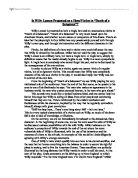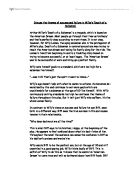Biff strives to meet his father’s expectations. Like any son, he wants to make his father proud. However, after catching his father with another woman, Biff is disillusioned, and rejects everything about Willy, particularly his “phoney dream” as he calls it in their final fight. Biff and Willy’s relationship ultimately becomes a power struggle, which leaves Happy in the shadows. Happy, needing the same attention as Biff, fails to get it from his father, and he ironically ends up with the same kinds of insecurities and compensating illusions as Willy.
Willy is under the constant strain and influence of a Capitalist society, and is therefore feeling the need and pressure to be someone he’s not. The idea of the ‘American Dream’ is central to him, and consequently his family in addition. He fills them with idealistic hopes and ambitions for the future, which evidently lead to his downfall. His paradoxical nature stems from his refusal to admit what his character is, and also on his insistence on trying to be someone he’s not – and wont be. Arthur Miller presents this as a core element of the play – the result of this is a sense of conflict within Willy himself, a sense of conflict within Biff, and a sense of conflict between them both.
A critic of the play stated that,
“Miller is portraying a typical American family in his “Death of a Salesman.” The everyday problems they face, and the strains society can have on them.”
But in my personal opinion, I feel that he is portraying this family as if everyone is like it. Linda, is presented as a housewife. Trapped at home, as a ‘crutch’ to her husband. She’s married to the ‘Man of the house’ who works all hours to support his family, of two typical sons. We notice that there are no daughters, and no mention of grandparents – Miller has portrayed it, and restricted it, to it just being them. Something which we perhaps see as slightly unrealistic.
I think it could be said, that Willy has a kind of obsession with his family, his sons in particular. He wants to see them both succeed, and has such high hopes that when Biff fails to meet his expectations, he is almost in agony. But this obsession can be traced back to his own deprived childhood. He admits to his brother Ben later in the play,
“Dad left when I was such a baby and I never had a chance to talk to him and I still feel – kind of contemporary about myself.”
I feel that Willy is really trying his best to be a good father. Even though he passes on his mistaken belief that being well-liked will ensure success, and he even sometimes encourages lawless behaviour, however, it is evident that his failure as a father is not through neglect, but rather as a result of his overpowering love. He extends his role too far, and tries to control the boys. I believe that it is this that makes them pass the element of concern about their father’s noticeable decline. They see him deteriorating, but due to his suffocating want of achievement for them, they pass the sense of worrying and just see him as an embarrassment.
“It got so embarrassing, I sent him to Florida.”
However, the boys don’t realise that they have more in common with their father than they think. Biff, like his father, has refused to see what he has actually done with his life. But on this return to his parents' home a crucial difference between Biff and Willy develops. Biff is aware of his own unhappiness. He takes a long and clear-eyed look at himself- and at his father. He insists on telling his father what he sees: that he has never been what his father thinks he is. From that new and painful truth, Biff is able to understand Willy and to forgive him and to give him the love that has long been stilled between them. The hope we are given at the end of the play is that Biff is capable of accepting himself. This balances the futility of Willy's life.
Moving on to the only woman in the family, Linda.
"You're my foundation and my support,"
Willy tells Linda. Even then he may be understating her devotion to him. She is the model of a loving, devoted, patient wife. When she married Willy, his dreams must have seemed like all she ever wanted in life. Those dreams have turned into a lifetime of frustrations. Disappointed and worried, Willy sometimes treats Linda cruelly or insensitively, but she understands the pain and fear behind his behaviour, and forgives him those moments. Miller tells us,
"she more than loves him, she admires him."
A man with as fragile a sense of self-worth as Willy cannot tolerate his wife's disagreeing with him, so Linda has long practiced ignoring her own opinions. She has always supported Willy in his illusions about himself- he had so convinced her of his possibilities at home that she talked him out of his one chance to go to Alaska with Ben. She manages to be cheerful most of the time.
I personally think that she is a woman who has aged greatly because of her difficult life supporting her family, especially her husband’s hallucinations and erratic behaviour which she contends with alone. She is the moral centre of the family, occasionally stern and not afraid to confront her sons on their poor treatment of their father. She is the family’s source of peace and finds herself continually trying to ease the tension between her husband and sons.
Linda as she was in the past is the way Willy chooses to remember her (as is the case with all the characters when he recalls them). Willy's guilt turns her into an even sweeter and more noble woman, a shining example of a "good woman." We also see that it is Linda who has kept a clear picture of their finances. When Willy boasts of big sales, she gently questions until she learns the truth- never rebuking him for exaggeration (lying). She does the best she can with their poor income to pay their endless bills, trying to hold the family unit together.
There is a sense that Linda has made a child of her husband, always indulgent and affectionate with him. She senses that Willy is in trouble, and to protect him she is terrifyingly tough on the two grown-up boys. She is a good and understanding mother, but will not tolerate her sons crossing their father. After the boys abandon their father in a restaurant for dates with women they've picked up, she blisteringly attacks both of them: "There's no stranger you'd do that to!"
Linda knows her beloved Willy is a "little man," but she feels he deserves at least the respect of his sons:
"Attention, attention must finally be paid to such a person."
Miller’s technique of moving Willy’s mind from present day into a state of reminiscence, skilfully shows us what the family was like in the past, as a contrast to that of the present day. The family which we see in the past seems to be a closer one than that of today. The boys idolized their father and Biff was out to impress him:
“We’ll carry your bags, Pop!”
“This Saturday, Pop, this Saturday – just for you, I’m going to break through for a touchdown.”
There were some similarities between the past and present family. It is clear that Willy still had that strong thirst for success, and he continued to fill his sons with the false idealistic hopes, which would lead to their downfall. In the past family, there was evidence of strong parental moments, where Willy would give fatherly advice.
“Just wanna be careful with those girls, Biff, that’s all. Don’t make any promises.”
In the present, this has changed, and now all Willy can do, mainly due to his disappointment, is criticise him.
“There’s such an undercurrent in him . . . . . The trouble is he’s lazy, goddammit!”
The strong criticism between family members, shows us how the family bond in the present day is deteriorating.
Miller has included Ben, Willy’s brother, into the play. Willy reveres him, and has made him into a symbol of success. Because of his ambitions and dapper personality, Ben somehow ended up with diamond mines. When Willy feels discouraged, he consults his imaginary picture of his brother. He looks up to him, and finds him as a source of inspiration and someone to follow in life.
The ‘family theme’ in ‘Death of a salesman’ can be seen through each of the characters individual attitudes and outside relationships. Miller shows us a ‘typical’ American family, striving to meet the pressures of a Capitalist society, facing conflicts within their family unit. He shows us their deterioration, and struggle to stay together, as a ‘family.’ Miller states,
“I wanted the theme of ‘family’ to be pivotal. The idea of connecting with each other, the need to feel others as a part of ourselves, and ourselves as a part of them. It’s an impulse native to all of us.”







